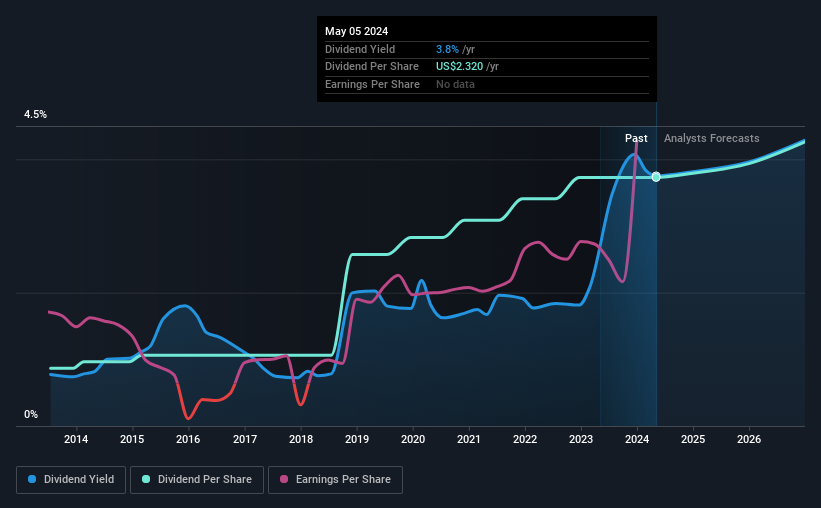FMC (NYSE:FMC) Has Affirmed Its Dividend Of $0.58
FMC Corporation (NYSE:FMC) has announced that it will pay a dividend of $0.58 per share on the 18th of July. This means the annual payment is 3.8% of the current stock price, which is above the average for the industry.
View our latest analysis for FMC
FMC's Payment Has Solid Earnings Coverage
If the payments aren't sustainable, a high yield for a few years won't matter that much. FMC is quite easily earning enough to cover the dividend, however it is being let down by weak cash flows. In general, we consider cash flow to be more important than earnings, so we would be cautious about relying on the sustainability of this dividend.
Over the next year, EPS is forecast to fall by 53.0%. Assuming the dividend continues along recent trends, we believe the payout ratio could be 51%, which we are pretty comfortable with and we think is feasible on an earnings basis.
FMC Has A Solid Track Record
The company has an extended history of paying stable dividends. Since 2014, the dividend has gone from $0.54 total annually to $2.32. This works out to be a compound annual growth rate (CAGR) of approximately 16% a year over that time. So, dividends have been growing pretty quickly, and even more impressively, they haven't experienced any notable falls during this period.
The Dividend Looks Likely To Grow
Some investors will be chomping at the bit to buy some of the company's stock based on its dividend history. FMC has impressed us by growing EPS at 24% per year over the past five years. Rapid earnings growth and a low payout ratio suggest this company has been effectively reinvesting in its business. Should that continue, this company could have a bright future.
Our Thoughts On FMC's Dividend
In summary, while it's good to see that the dividend hasn't been cut, we are a bit cautious about FMC's payments, as there could be some issues with sustaining them into the future. With cash flows lacking, it is difficult to see how the company can sustain a dividend payment. We would probably look elsewhere for an income investment.
Market movements attest to how highly valued a consistent dividend policy is compared to one which is more unpredictable. Still, investors need to consider a host of other factors, apart from dividend payments, when analysing a company. Case in point: We've spotted 4 warning signs for FMC (of which 3 can't be ignored!) you should know about. If you are a dividend investor, you might also want to look at our curated list of high yield dividend stocks.
Have feedback on this article? Concerned about the content? Get in touch with us directly. Alternatively, email editorial-team (at) simplywallst.com.
This article by Simply Wall St is general in nature. We provide commentary based on historical data and analyst forecasts only using an unbiased methodology and our articles are not intended to be financial advice. It does not constitute a recommendation to buy or sell any stock, and does not take account of your objectives, or your financial situation. We aim to bring you long-term focused analysis driven by fundamental data. Note that our analysis may not factor in the latest price-sensitive company announcements or qualitative material. Simply Wall St has no position in any stocks mentioned.

 Yahoo Finance
Yahoo Finance 
